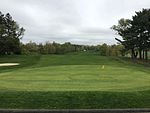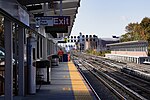Creedmoor Psychiatric Center

Creedmoor Psychiatric Center is a psychiatric hospital at 79-26 Winchester Boulevard in Queens Village, Queens, New York, United States. It provides inpatient, outpatient and residential services for severely mentally ill patients. The hospital occupies more than 300 acres (1.2 km2) and includes more than 50 buildings.The site was named after the Creed family, which farmed on the site. It later was used as a firing range from the 1870s until 1892. The Farm Colony of Brooklyn State Hospital was opened on the site in 1912, with 32 patients. By 1959, the hospital housed 7,000 inpatients. The hospital's census declined by the early 1960s, and unused portions were sold off and developed into the Queens County Farm Museum, a school campus, and a children's psychiatric center.
Excerpt from the Wikipedia article Creedmoor Psychiatric Center (License: CC BY-SA 3.0, Authors, Images).Creedmoor Psychiatric Center
Winchester Boulevard, New York Queens County
Geographical coordinates (GPS) Address Phone number Website External links Nearby Places Show on map
Geographical coordinates (GPS)
| Latitude | Longitude |
|---|---|
| N 40.741388888889 ° | E -73.731666666667 ° |
Address
Creedmoor Psychiatric Center
Winchester Boulevard 79-25
11427 New York, Queens County
New York, United States
Open on Google Maps









